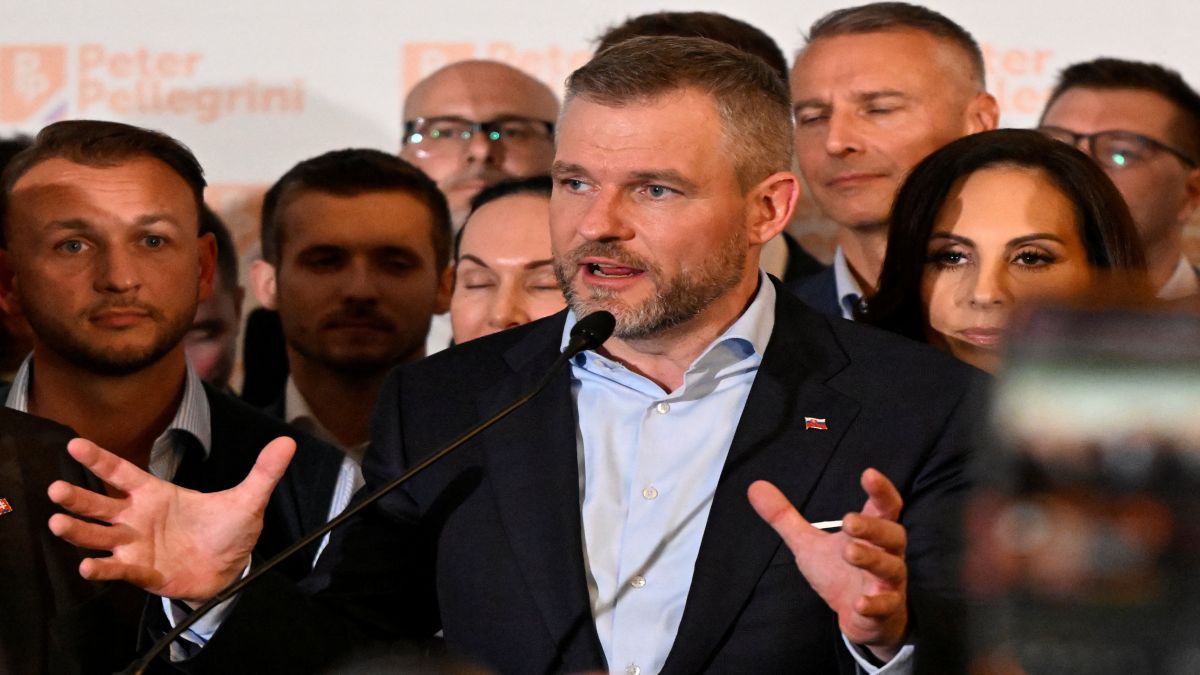Slovak nationalist-left government candidate Peter Pellegrini won the country’s presidential election on Saturday, with 53.26 per cent of the vote, versus 46.73 per cent for pro-Western Opposition candidate Ivan Korcok. The victory cemented the influence of pro-Russian prime minister Robert Fico over Slovakia.
Fico, who began his fourth term in October, has shifted Slovakia’s foreign policy towards pro-Russian positions while also initiating reforms to criminal law and media regulations, raising concerns about the erosion of the rule of law.
His coalition, including the party led by Pellegrini, stopped Slovakia’s official arms shipments to Ukraine , criticising what he perceives as Western interference in the conflict, along with cautioning against Slavic nations engaging in hostilities with each other.
Pellegrini has emphasised that his win signifies support for the government’s agenda and a rejection of an “opportunistic Opposition power centre,” a reference to outgoing liberal president Zuzana Caputova.
Isolated from EU
Slovakia’s international isolation will increase with Ukraine-sceptic Peter Pellegrini as president, analysts said Sunday, expecting the government to crank up its pro-Russian rhetoric with its ally as head of state.
The former premier, 48, defeated pro-West diplomat Ivan Korcok by a comfortable margin in Saturday’s election, which was dominated by divisions over the war in neighbouring Ukraine.
Impact Shorts
More ShortsKorcok argued Ukraine should not give up territory to achieve peace, while Pellegrini advocated peace talks with Russia.
“I will not be the president of war,” Pellegrini said after his win.
Pellegrini is a longtime ally of Prime Minister Robert Fico, who has questioned Ukraine’s sovereignty and discontinued military aid to Ukraine since taking office last October.
Outgoing president Zuzana Caputova, a staunch Ukraine supporter like Korcok, has been a counterweight to the government coalition including Fico’s Smer party, Pellegrini’s Hlas and the small far-right SNS
“Pellegrini’s win will certainly deepen Slovakia’s isolation in NATO and the EU,” Tomas Koziak, a political analyst from the University of International Business ISM, told AFP.
He added Pellegrini would now be Fico’s “extended arm”.
“Pellegrini in the presidential palace will do what Fico needs.”
Though the office is largely ceremonial, Slovakia’s president is the commander-in-chief of the armed forces, ratifies international treaties and appoints top judges.
Koziak said with Pellegrini as president, Fico could wield influence over the judiciary, which will help him boost his position.
“Slovakia could become the next Hungary,” Koziak said.
Hungary has become increasingly at odds with the EU by violating the rule of law and hampering the bloc’s efforts to help Ukraine.
Koziak said Fico had already taken a page from Hungary’s book by “trying to take control of public television and radio”.
‘International perception of Slovakia will worsen’
Bratislava-based Comenius University analyst Aneta Vilagi told AFP that Fico’s government had tarnished Slovakia’s international reputation.
She said the situation would worsen when Caputova leaves.
“With Pellegrini as president, this new approach of government will only be enhanced because they will not have a counterbalance.”
Pellegrini showed his alignment with the government before the election, using the fear of war as a campaign topic.
“He alleged Korcok would send… Slovak soldiers to fight for Ukraine”, although the president cannot do that under the law, said analyst Darina Malova.
Smer won last year’s general election with an anti-war narrative and the phrase “not a single bullet for Ukraine”, denying military aid.
“The international perception of Slovakia will worsen because Pellegrini has adopted this narrative,” Malova told AFP.
“Slovakia will be seen very negatively as a partner in the EU and NATO.”
Pellegrini played down the impact of the election on foreign policy, insisting that “we will continue to be a strong EU and NATO member”.
Koziak believes change will come in the form of rhetoric.
“I don’t expect a definitive deviation towards Russia. It will only happen on a declaratory level,” he said.
“Fico has to give something back to his voters, who have strong pro-Russian attitudes — a sentiment present in Fico himself. I expect statements in favour of Russia,” he told AFP.
Slovaks are among Central and Eastern Europe’s most Kremlin-inclined citizens.
More than one in two told pollsters from the Globsec think tank that the West or Kyiv were to blame for the war in Ukraine, with analysts blaming their stance on disinformation spread on social media.
Only seven per cent believed the same in neighbouring Poland, along with fewer than a quarter of Czechs, according to the 2023 report.
Russophilia has a long history in Slovakia. Russia was seen as a protector of Slavs in the days of Austria-Hungary, and many Slovaks still feel nostalgia for the communist regime that ruled for decades after World War II.
Koziak said Pellegrini had “no problem with such pro-Russian sentiment”.
Malova agreed, saying: “Pellegrini does not care about the war or Russia. He only cares about his career.”
With inputs from AFP


)

)
)
)
)
)
)
)
)



